Failed Step 2ck When to Take Again

Few feelings are worse than declining Step 1 or Step 2 CK. For and so long, we've excelled in school. So when nosotros fail a pregnant exam, it hurts more than our pride. Our identity is tied upwards in doing well. Thus, failure tin even feel similar a grapheme flaw, like something is wrong with us.
If you didn't pass a USMLE, information technology might feel like the earth has concluded. However, it'due south not every bit bad as y'all call up. I've worked with many students who have survived – even thrived – after a USMLE failure.
Failing your Boards doesn't mean something is wrong with you. However, information technology means that there is something incorrect with your arroyo.
In this article, you volition larn:
- Pass/fail rates for Step 1 and Pace 2 CK, plus the likelihood of matching after multiple attempts
- How program directors look at failures
- Practical next steps to take
- The nigh common reasons people don't pass their Boards, and how to overcome them, and
- Much more than
(To read seven Most Eatables Reasons Your NBMEs Aren't Improving (And How to Fix Them), click here).
Table of Contents
Failing Step 1, Step 2 CK: How Bad Is Information technology, Really?
If yous're reading this, you lot may be wondering just how bad information technology is if you've failed your USMLE. In this section, nosotros'll look at the pass/fail rates for each USMLE. Then we'll talk over how residencies view failed USMLE attempts, and the touch on on match rates for United states of america grads and IMGs.
Laissez passer/Fail Rates for Step 1 and Step 2 CK
First, let's look at the statistics for passing Step 1 and Step two CK.
Step i Passing Rates:
| # Tested (2017) | % Passing (2017) | # Tested (2018) | % Passing (2018) | |
|---|---|---|---|---|
| Physician Degree | 21,382 | 94% | 21,611 | 95% |
| 1st Takers | twenty,353 | 96% | xx,670 | 96% |
| Repeaters** | 1,029 | 67% | 941 | 67% |
| Practise Degree | 3,835 | 95% | 4,136 | 96% |
| 1st Takers | iii,786 | 95% | 4,092 | 96% |
| Repeaters** | 49 | 76% | 44 | 73% |
| IMGs | 17,203 | 73% | 16,443 | 75% |
| 1st Takers | 14,900 | 78% | xiv,332 | 80% |
| Repeaters** | 2,303 | 41% | 2,111 | 44% |
Step 2 CK Passing Rates:
| # Tested (2016-2017) | % Passing (2016-2017) | # Tested (2017-2018) | % Passing (2017-2018) | |
|---|---|---|---|---|
| Medico Degree | 21,071 | 95% | 22,367 | 96% |
| 1st Takers | xx,140 | 96% | 21,531 | 97% |
| Repeaters** | 931 | 66% | 836 | 66% |
| DO Caste | ii,581 | 94% | iii,076 | 94% |
| 1st Takers | 2,547 | 95% | three,038 | 95% |
| Repeaters** | 34 | 68% | 38 | 74% |
| IMGs | fourteen,291 | 76% | 13,613 | 78% |
| 1st Takers | 11,949 | 81% | eleven,469 | 83% |
| Repeaters** | two,342 | 50% | 2,144 | 52% |
** 'Repeaters' represents examinations given, not number of examinees.
What exercise you notice? At least 5% of U.s.a. Dr. students fail a USMLE. More than 25% of IMGs will fail one USMLE. If you're reading this statistic, you lot're not alone. Also, equally you'll come across side by side, not passing a USMLE doesn't doom you to a residency-less futurity.
How USMLE Failure Affects Residency Applications
How do residency programs view failure on a USMLE? Let'south look at the statistics.
Every two years, the NRMP surveys programme directors (PDs). They inquire a big number of questions about what the PDs look for in residency applicants.
One of the questions: Would your plan consider applicants who fail the USMLE on the first attempt? Here are the results when looking at all PD responses for 2018:
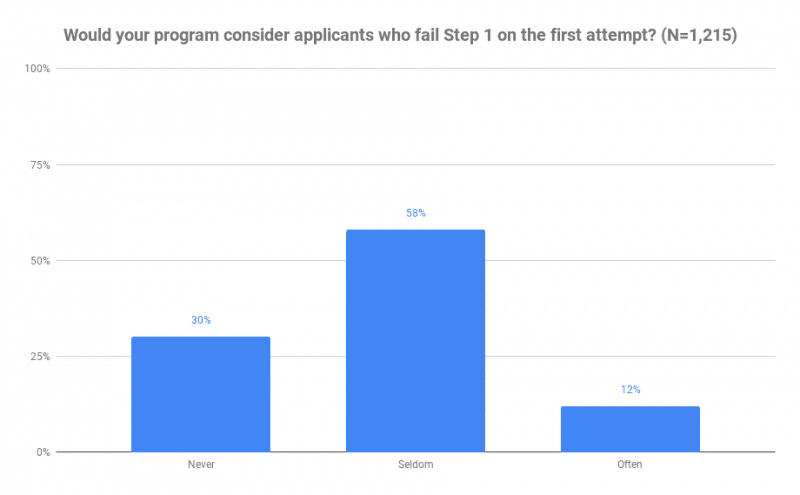
Less than 1/3 of programs say they "never" consider someone who failed Step i
And the survey results for Step ii CK:
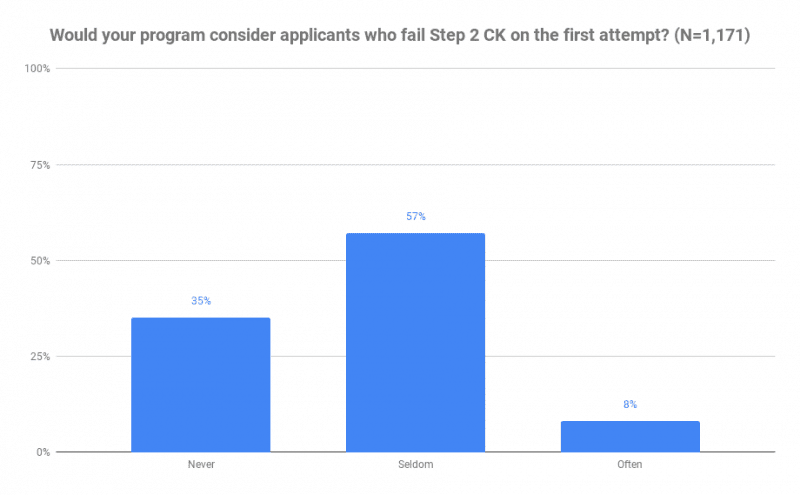
Similarly, 35% of programs say they "never" consider someone who failed Step two CK
The upshot? Roughly one/iii of programs will reject your application if you take a USMLE failure. ~10% of programs volition consider you regardless. In-between? Near threescore% volition "seldom" consider you. What that means is that information technology'due south critical that y'all find other ways to stand up out. (More on this subsequently).
What Programs Are Most Forgiving of Declining?
While aggregate programme data is interesting, you're not applying to all residencies at in one case. Instead, you will probable be applying to ane or a few specialties. And then how does each specialty view failing Step one or Footstep 2 CK?
In these tables, we answer that question. From the same, 2018 Program Directory survey, nosotros collected the data for each specialty. (Click on column headers to sort information).
"Would your program consider applicants who fail Step i on the offset attempt?"
| Never | Seldom | Often | |
|---|---|---|---|
| Anesthesiology (Northward = 58) | 34% | 66% | 0% |
| Child Neurology (N = 33) | 27% | 70% | 3% |
| Dermatology (18) | 50% | 50% | 0% |
| Emergency Medicine (84) | 37% | 61% | 2% |
| Family unit Medicine (141) | 3% | 47% | 50% |
| Internal Medicine (163) | 23% | 66% | xi% |
| Internal Medicine/Pediatrics (26) | 35% | 62% | iv% |
| Interventional Radiology (14) | 64% | 36% | 0% |
| Neurological Sugery (24) | 58% | 38% | 4% |
| Neurology (37) | 27% | 59% | 14% |
| Obstetrics and Gynecology (79) | 34% | 65% | 1% |
| Orthopaedic Surgery (46) | 65% | 35% | 0% |
| Otolaryngology (32) | 56% | 44% | 0% |
| Pathology (40) | 28% | 68% | 5% |
| Pediatrics (73) | 4% | 79% | sixteen% |
| Physical Medicine and Rehabilitation (24) | 8% | 79% | 13% |
| Plastic Surgery (20) | eighty% | xx% | 0% |
| Psychiatry (58) | iii% | 62% | 34% |
| Radiations Oncology (25) | 52% | xl% | viii% |
| Radiology-Diagnostic (42) | 43% | 52% | 5% |
| Surgery (97) | 46% | 53% | one% |
| Thoracic Surgery (8) | 30% | 70% | 0% |
| Transitional Year (27) | 44% | 52% | 4% |
| Vascular Surgery (13) | 23% | 77% | 0% |
"Would your program consider applicants who neglect Step 2 CK on the first attempt?"
| Never | Seldom | Often | |
|---|---|---|---|
| Anesthesiology (Northward = 57) | 40% | 58% | 2% |
| Child Neurology (Northward = 33) | 39% | 58% | 3% |
| Dermatology (fifteen) | 60% | 40% | 0% |
| Emergency Medicine (83) | 46% | 53% | 1% |
| Family Medicine (140) | 7% | 60% | 33% |
| Internal Medicine (160) | 33% | 61% | six% |
| Internal Medicine/Pediatrics (25) | 48% | 52% | 0% |
| Interventional Radiology (fourteen) | 43% | 57% | 0% |
| Neurological Sugery (21) | 43% | 52% | 5% |
| Neurology (36) | 36% | 58% | 6% |
| Obstetrics and Gynecology (77) | 51% | 49% | 0% |
| Orthopaedic Surgery (41) | 63% | 37% | 0% |
| Otolaryngology (26) | 58% | 42% | 0% |
| Pathology (39) | 21% | 74% | v% |
| Pediatrics (73) | 15% | 79% | 5% |
| Concrete Medicine and Rehabilitation (23) | thirteen% | 74% | 13% |
| Plastic Surgery (xvi) | 81% | 19% | 0% |
| Psychiatry (58) | 14% | 55% | 31% |
| Radiation Oncology (21) | 52% | 43% | 5% |
| Radiology-Diagnostic (39) | 36% | 56% | 8% |
| Surgery (94) | 52% | 46% | two% |
| Thoracic Surgery (8) | 25% | 75% | 0% |
| Transitional Yr (26) | 42% | 54% | four% |
| Vascular Surgery (13) | 31% | 69% | 0% |
What do you notice? There is a wide range of responses to not passing a USMLE. At the extreme cease, ~lxxx% of plastic surgery program directors who responded said they would "never" consider someone who failed Step one or Step 2 CK.
On the other end, in specialties similar family medicine, psychiatry, pediatrics, and PM&R a Pace 1 failure wasn't a hard "no." Fewer than x% of these latter programs would "never" consider someone with a Pace i fail.
How Many People Match Afterward Declining Stride ane or Pace 2 CK?
If y'all've failed the USMLE, y'all may already be wondering what your chances of matching are. Are you doomed?
The news isn't equally bad every bit you lot might recollect. For IMGs, the nigh recent available data is from 2013. (They stopped publishing outcomes on USMLE attempts and matching after 2013). The data propose failing either Stride 1 or Footstep 2 CK in one case decreases your adventure of matching by ~20-25%.
(To read The IMG'south Guide to Obtaining Residency in the United States, click here).
For Step one:
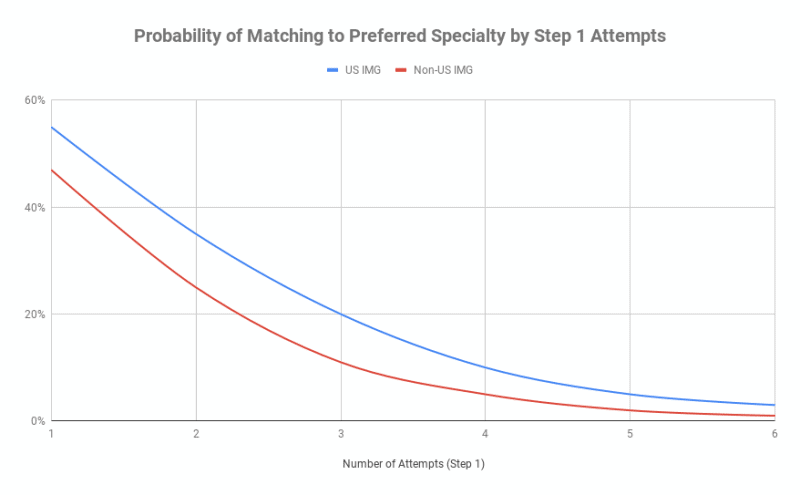
For IMGs, the probability of matching decreases with increased Step 1 attempts
And for Step 2 CK:
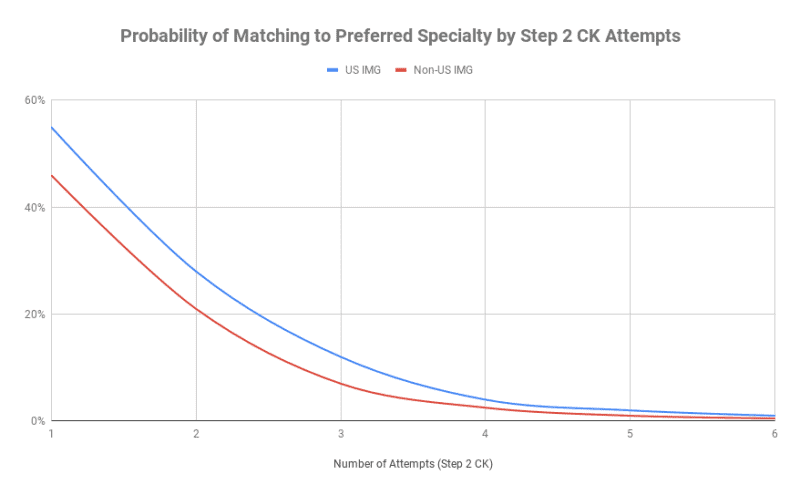
Similarly, for IMGs, the probability of matching decreases with increased Stride two CK attempts
For IMGs, the absolute probability of matching decreases by roughly 20-25% later on one failed USMLE attempt.
For US allopathic (Doc) grads, the number of people matching later on non passing a USMLE is likely much higher. This JAMA study found > 99% of graduates entered GME/practice in the The states inside 6 years of graduation. In other words, even though roughly 3% of people didn't match in a given year, most ended upwards in residency/practice. In one US allopathic school, 92% of students (59 of 64) who had failed the USMLE matched.
I've worked with many students who have failed a USMLE and went on to residency. While your chances are lower, the door isn't airtight.
Didn't Pass Your USMLE? Here'due south What You Should Do Next
Then far, yous've learned that you're not alone. Plenty of students have been in your shoes over the years. Plus, many programs will all the same await at your application.
Notwithstanding, only because the door isn't airtight doesn't hateful it is articulate sailing. Failing a USMLE almost always indicates severe underlying issues in your grooming. With proper reflection, failing a USMLE can be the impetus for a change in your career arc. Next, we will talk over how to ensure the best possible outcome the adjacent time around.
Current Med Students: Contact Your Administration
If you're currently a medical student, you demand to contact your administration. Information technology'southward usually rubber to start with your bookish advisor. If that's non possible, you tin reach out to an academic dean. Whatever you lot do, it'southward essential to let your schoolhouse know. (Note: the NBME may have already alerted your school).
Why is information technology important to keep your school in the loop? Because there are practical and administrative consequences you'll need aid navigating.
If you failed Step i, often students will have to delay/pull out of clerkships. This is because some schools require students to pass Step 1 to exist in clerkships. Other schools simply may want to give you dedicated time to pass your test.
If you failed Step ii CK, you might exist close to finishing clerkships, or at least your core clerkships. Y'all'll need to coordinate with your schoolhouse on how to go along.
If you're an IMG or are not in med schoolhouse currently, you may not have to worry about these logistics. However, no affair your state of affairs, you'll need to re-evaluate your approach.
Attain Out to Others
If y'all didn't pass a USMLE, it might feel like one of the darkest periods of your life. It feels awful. However, you shouldn't go through it alone.
Under the best of circumstances, social isolation is bad for your well-being. It'due south fifty-fifty worse when you're undergoing adversity. Plus, adversity frequently tears downwardly the masks we put up and allows for 18-carat connection. Indeed, some of my darkest hours have forged some of my closest friendships.

If you neglect Step 1 or Step 2 CK, you might be tempted to hold everything inside. Instead, we recommend seeking out others.
Reassess Your Residency Timeline
Some other matter to consider: how will not passing touch the yr you apply to residency?
If you lot're lucky, you may not need to delay your graduation/when yous apply for residency. However, you may have to consider moving back your awarding by at least a year.
Why? First, issues of approach aren't fixed overnight. You will need at to the lowest degree a calendar month (and possibly much more) to study again. (More than on this later). 2nd, remember ~60% of programs "seldom" consider applicants with USMLE fails. Actress time will assist y'all round out your application and stand out in other ways.
(To read Get Into a Elevation Residency: 5 Things You lot Need to Know, click here).
Next, we'll look at how to address the about common reasons people neglect to maximize time to come success.
Reflection: Why Did You Fail, and What to Do Next Time?
A wide range of people doesn't laissez passer the USMLE. Yet, there are several commonalities among those who fail their exam. Hither nosotros'll talk over the 3 about mutual reasons people fail the USMLE, and what you tin practice to ameliorate the adjacent time. And then we'll discuss test-specific communication.
Reason #1: Cramming
The well-nigh mutual reason students fail a USMLE is they don't understand the material. Instead of mastering it, they memorize it, hoping to go by on "fizz-words."
Remember, the NBME designs the USMLE to test understanding, NOT memorization. Vignettes weed out crammers.
(To read How Are USMLE Questions Written? 9 Open Secrets for Impressive Boards Scores, click here).
Why do so many people memorize rather than master the textile? Ofttimes, they think they don't have enough time and review subjects besides rapidly. (More on this next). Also, almost of us never learned how to primary the material. From elementary school onward, instead of knowing "why?" we squeezed by but knowing "what."
Developing mastery is the #1 about important matter you tin develop to plough your USMLE disappointment into success. To know what mastery looks similar, check out this Yousmle Online Course lecture.
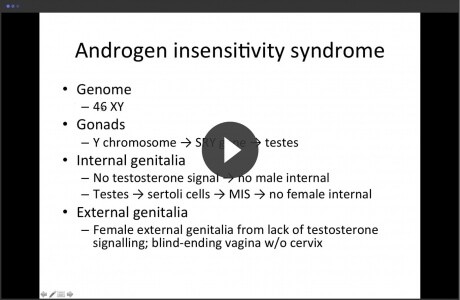
Don't know how to primary material to practise well on your USMLEs? Scout this.
Discover how you can make sense of things people typically memorize:
- What hormones are high/low at dissimilar parts of the menstrual cycle
- The internal/external genitalia of various genetic disorders
- Why we use hCG for pregnancy tests
Understanding the material will not but help heave your USMLE score. Information technology will likewise aid you be a improve doc. Having to re-study for a Board exam is a nifty way to develop a amend approach to learning.
Reason #ii: Not Plenty Time
If cramming is the tiptop reason for USMLE failure, not studying for long enough is a shut second. The typical lead-up to the USMLE is this:
- Early Med School: Feel overwhelmed by the book of material. Cram just to stay adrift.
- Twelvemonth Leading Up to Dedicated Study: Still feel overwhelmed. By now, take forgotten most first-twelvemonth material, however, don't know a better style to study exists. Continue to memorize to pass your school's exams.
- Dedicated Study: Realize your noesis is woefully inadequate. However, make up one's mind you can't delay your examination. Pack everything into a condensed menses, and rush through the material.
- 1 Week Earlier Test: Panic, realize y'all're not set up. You lot may fifty-fifty delay by a month. (Even though yous need much longer to gear up correctly). Notwithstanding, you didn't learn anything properly the first time. But because your timeline is all the same likewise brusque, you blitz through the textile.
What do you do if you if you're in the perma-cram cycle and never have enough time? Program on having plenty time from the start. Recall:
- Cramming for ane month + one month + 1 calendar month ≠ 3 months of proper studying
Rushing through UFAP in one month and not retaining anything leaves you stuck in neutral. You make no forward progress. Instead, taking your time and adequately learning the textile makes your preparations shorter.
Reason #3: Poor Benchmarking
When someone tells me they failed Step i or Step 2 CK, my adjacent question is this:
- What were your nigh contempo NBME self-assessments before your exam?
Almost people say they either:
- Didn't take a exercise exam, or
- Had predicted scores beneath passing, but sat for their test anyway
Frequently people tell me that their school put pressure on them. (If your schoolhouse pressures you into taking your exam when you're predicted to fail, shame on them). Others say they were hoping for an exceptional exam day to heave their score.
People who have their test earlier they're ready nigh always regret it. My advice? Don't take your test without evidence of beingness close to your minimum acceptable score.
Adjacent, permit's wait at examination-specific reasons why people fail.
Test-Specific Observations Why People Fail Step 1 and Footstep 2 CK
Why do people fail Pace 1 or Footstep 2 CK? It's well-nigh e'er due to a lack of understanding of the textile. For Stride 1, they usually don't understand the pathophysiologic mechanisms of the body. For Footstep ii CK, they struggle with interpreting the vignettes and rely on buzz-words.
Remember, failure on a USMLE isn't due to an immutable graphic symbol flaw. Instead, it'southward a problem of approach. It takes courageous cocky-reflection to address, withal, the potential payoff is immeasurable.
Concluding Thoughts: Failure is a Powerful Catalyst for Modify
I knew someone once who was rejected from all simply 3 med schools he applied to. What was shocking was he had scored in the 99%ile on the MCAT and had a perfect science GPA.
And so how did he get rejected by about everywhere? With only a so-so research groundwork, he had applied to MD-PhD programs. The problem? For MD-PhD applications, research experience is male monarch, non scores. In other words, his approach had been all wrong.
That person? It was me.
Information technology'south easy to measure our self-worth by external measures of success. I felt atrocious, and still feel a piddling embarrassed when I tell that story. However, failure often is the about potent catalyst for positive change.
Subsequently that failure, I scrutinized my arroyo to applications. It became clear I needed to tell a more compelling narrative, not just have high numbers. I also needed to lucifer that narrative to what programs were looking for.
I worked hard to change my arroyo, and it paid off. In med school, I won multiple national scholarships, ii for $x,000 each. I honed my residency awarding and was ranked-to-match at all my elevation choices.

Disappointment is an incredible growth opportunity.
Adversity Allows The states to Take An Honest Look at Our Approach
Pare back the veneer of invincibility we hide behind in medicine. You lot'll find many like stories of failure spring-boarding future success.
One IMG I tutored tells me to this 24-hour interval that failing her USMLE was the all-time affair that could have happened to her. Why? Because she realized her arroyo was wrong, and completely revamped it. Her Step 2 CK score? 261. She matched at her top selection Ob-Gyn program, a competitive field for anybody, permit lone for IMGs.
If yous didn't laissez passer your USMLE, it might experience similar the end of the globe. Instead, think of it as the chance to brand the hard changes that will make yous the person yous want to become.
At Yousmle, we've helped lots of students who struggled to laissez passer their USMLE. To acquire more virtually how we can help you change your approach to main – not memorize – for impressive Boards scores, contact us hither.
What do you think? Has your perspective inverse on failing a USMLE? Let us know in the comments!
Photos by Annie Spratt, Ales Me.
riverathencestraes.blogspot.com
Source: https://www.yousmle.com/fail-step/
Post a Comment for "Failed Step 2ck When to Take Again"